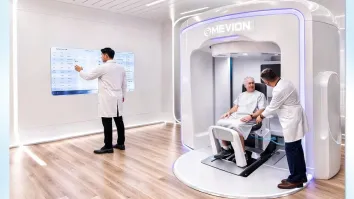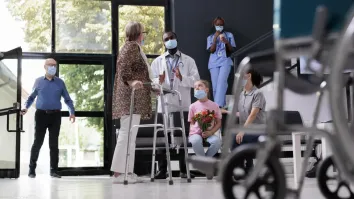
How healthcare sector shifts to AI-driven, patient-centric strategies
A modular approach can customise patient care, an expert said.
Healthcare leaders are future-proofing care delivery through innovation and patient-centric strategies—a trend that took centre stage at the Healthcare Asia Summit 2025 in Kuala Lumpur where industry experts explored solutions for efficient and sustainable healthcare systems.
L.E.K.'s Arnaud Bauer and Saleem Butt opened the summit with a keynote address, highlighting a shift from hospital-centric to more diversified healthcare models, and urging the development of systems that are modular, flexible, and patient-focused.
"A modular approach can help tailor patient pathways, but for these systems to work, they must be digitally connected,” Bauer told attendees at the Renaissance Kuala Lumpur Hotel & Convention Centre, 9 April.
The event continued with a fireside chat featuring Shuba Srinivasan, CEO of Prince Court Medical Centre, who shared the hospital’s digital transformation as one of the first private hospitals in Malaysia to adopt electronic medical records, and the development of a ‘one-stop’ app for appointments and payments.
Lim Ren Jun, Principal, Baker McKenzie, discussed the legal aspects of artificial intelligence (AI) and data in healthcare, along with the cybersecurity risks threatening the sector. “Due to the sensitive nature of healthcare data, there is a higher expectation for protection.”
“This is an important consideration when using AI," Lim added.
The first panel session defined technology’s role in modern healthcare with a focus on AI-driven diagnostics and connected ecosystems. The segment featured industry leaders Frost & Sullivan’s Rathanesh R, Sunway Medical Centre’s Seow Vei Ken, Novo Holdings Asia’s Navjeewan Khosla, and iKang Healthcare Group’s Cathy Liu.
Furthermore, Kamal Amzan, CEO of Gleneagles Hospital Johor and Regional CEO (Southern and Eastern) of IHH Malaysia, shared insights on optimising hospital operations such as patient admissions and discharges.
KPMG Asia Pacific’s Healthcare and Life Sciences Director, Anastasia Miros, outlined key traits of ‘trailblazing’ healthcare systems. “We often talk about technology and the workforce, but it really comes down to how many behaviours we need to change and how we are going to do that,”
In the meantime, a culture that fosters experimental and continuous learning is key to successful AI implementation, said Hoo Ling Lee, Regional CEO, Central, KPJ Healthcare Berhad.
The second panel discussed value-based care and sustainable financing in healthcare. KPMG’s Yee Keng Lee, Pureland Group’s Chris Hardesty, Makati Life Medical Center’s Lawrence Sibayan, and Sunway Healthcare Group’s Chelsea Cheng addressed both challenges and opportunities for innovation and better patient outcomes.
Ram Nivas, an EY-Parthenon Associate Partner, discussed developing data-driven strategies with a focus on building scalable models to support sustainable AI applications.
Best practices include creating a ‘playbook’ for insights and ensuring close coordination with medical teams, Nivas said.
Meanwhile, challenges such as poor accessibility and inefficient resources highlight the need for better integration, Dennis Sta. Ana, President and CEO of Makati Life Medical Center, said.
“What's very important is strategic partnerships amongst stakeholders,” Sta. Ana said. “When you leverage government support and private sector expertise to build impactful infrastructure and technology, you enable smarter and faster outcomes.”
Adjariya Ezor, CIO, Bangkok Hospital Pattaya and Jomtien Hospital, presented the '3 Ps' approach, demonstrating how smart health risk assessments can redefine patient care.
Eric Woo, Vice President, ECRI, discussed the promising outcomes of AI in healthcare, particularly in population health management and medical predictions. Telemedicine, whilst not designed for all clinical work, is also mentioned as a promising tool for improving care delivery.
However, Woo noted that 62% of physicians still do not use AI solutions. “65% have recognised the technology’s advantage.”
The summit concluded with a final panel featuring Frost & Sullivan’s Sowmya Srinath, Sunway TCM Centre’s Chan Si Yan, Assunta Hospital ASSISS’ Darshinia Ballasingam, and Institut Jantung Negara’s Shaiful Azmi Yahaya, who touched on the importance of patient-centric care, emphasising the integration of consumer insights and innovative care models.



















 Advertise
Advertise






